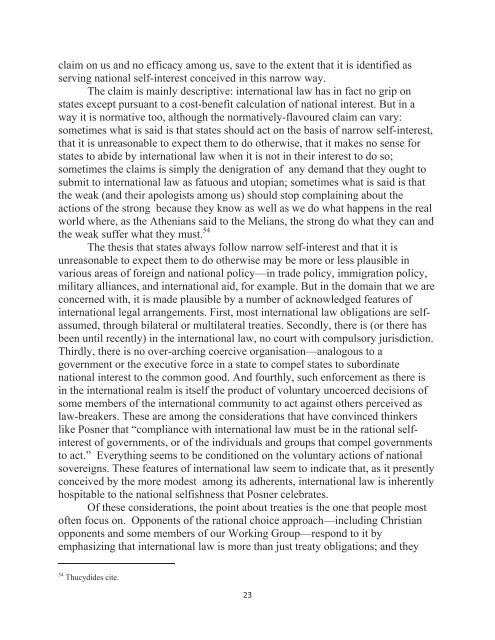International Legal Evangelism: Intelligence, Reconnaissance & Missions
International Legal Evangelism: Intelligence, Reconnaissance & Missions
International Legal Evangelism: Intelligence, Reconnaissance & Missions
You also want an ePaper? Increase the reach of your titles
YUMPU automatically turns print PDFs into web optimized ePapers that Google loves.
claim on us and no efficacy among us, save to the extent that it is identified as<br />
serving national self-interest conceived in this narrow way.<br />
The claim is mainly descriptive: international law has in fact no grip on<br />
states except pursuant to a cost-benefit calculation of national interest. But in a<br />
way it is normative too, although the normatively-flavoured claim can vary:<br />
sometimes what is said is that states should act on the basis of narrow self-interest,<br />
that it is unreasonable to expect them to do otherwise, that it makes no sense for<br />
states to abide by international law when it is not in their interest to do so;<br />
sometimes the claims is simply the denigration of any demand that they ought to<br />
submit to international law as fatuous and utopian; sometimes what is said is that<br />
the weak (and their apologists among us) should stop complaining about the<br />
actions of the strong because they know as well as we do what happens in the real<br />
world where, as the Athenians said to the Melians, the strong do what they can and<br />
the weak suffer what they must. 54<br />
The thesis that states always follow narrow self-interest and that it is<br />
unreasonable to expect them to do otherwise may be more or less plausible in<br />
various areas of foreign and national policy—in trade policy, immigration policy,<br />
military alliances, and international aid, for example. But in the domain that we are<br />
concerned with, it is made plausible by a number of acknowledged features of<br />
international legal arrangements. First, most international law obligations are selfassumed,<br />
through bilateral or multilateral treaties. Secondly, there is (or there has<br />
been until recently) in the international law, no court with compulsory jurisdiction.<br />
Thirdly, there is no over-arching coercive organisation—analogous to a<br />
government or the executive force in a state to compel states to subordinate<br />
national interest to the common good. And fourthly, such enforcement as there is<br />
in the international realm is itself the product of voluntary uncoerced decisions of<br />
some members of the international community to act against others perceived as<br />
law-breakers. These are among the considerations that have convinced thinkers<br />
like Posner that “compliance with international law must be in the rational selfinterest<br />
of governments, or of the individuals and groups that compel governments<br />
to act.” Everything seems to be conditioned on the voluntary actions of national<br />
sovereigns. These features of international law seem to indicate that, as it presently<br />
conceived by the more modest among its adherents, international law is inherently<br />
hospitable to the national selfishness that Posner celebrates.<br />
Of these considerations, the point about treaties is the one that people most<br />
often focus on. Opponents of the rational choice approach—including Christian<br />
opponents and some members of our Working Group—respond to it by<br />
emphasizing that international law is more than just treaty obligations; and they<br />
<br />
54 Thucydides cite.<br />
<br />
23

















